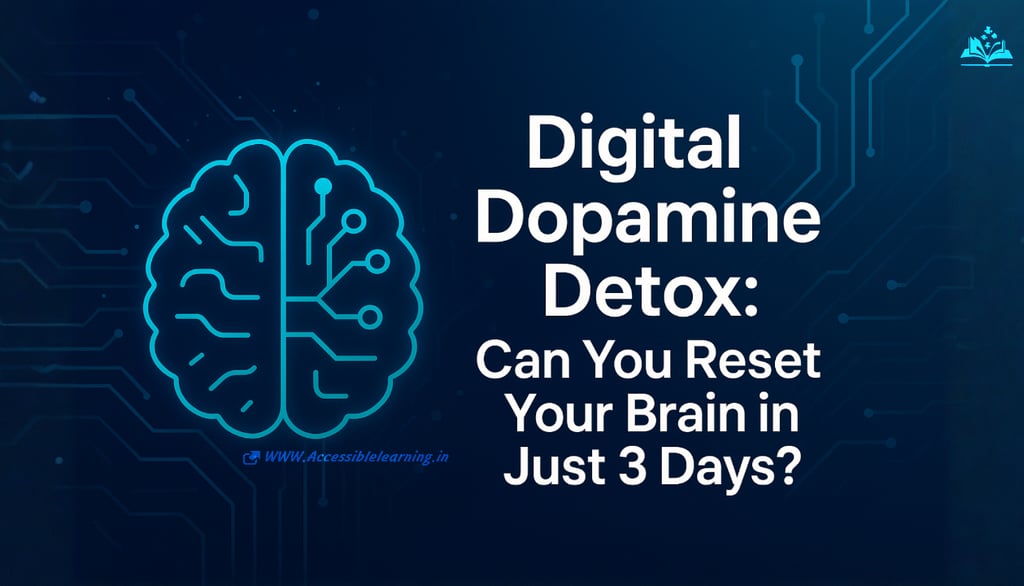
Digital Dopamine Detox: Can You Reset Your Brain in Just 3 Days?
Can a 3-day digital dopamine detox reset your brain and boost focus? Discover the neuroscience behind dopamine, how to detox from screen addiction, and practical tips to reclaim mental clarity, balance, and productivity—starting today.
AI/FUTUREMODERN DISEASESNEW YOUTH ISSUESAWARE/VIGILANT
Kim Shin
8/8/20255 min read


In a world of constant notifications, viral videos, and infinite scrolling, our brains are increasingly overstimulated. Many are now turning to digital dopamine detoxes—short breaks from technology—to recalibrate their attention, motivation, and emotional balance.
But can a 3-day dopamine detox truly reset your brain? This article explores the science behind dopamine, the growing popularity of digital detoxing, and whether 72 hours offline can make a tangible difference in your mental well-being.
What is a Digital Dopamine Detox?
A dopamine detox—sometimes called a "dopamine fast"—is the intentional avoidance of stimulating activities like
Social media
Streaming platforms
Video games
Instant messaging
Clickbait content
During a digital dopamine detox, the goal isn’t to eliminate dopamine (which is impossible and unhealthy), but to reduce your brain’s over-reliance on instant gratification and allow natural dopamine regulation to stabilize.
Understanding Dopamine: The Brain’s Reward Chemical
Dopamine is a neurotransmitter responsible for motivation, pleasure, and reward-seeking behavior. It spikes when you receive likes, messages, or exciting content—creating feedback loops that make you crave more stimulation.
Key Fact: Studies show that repeated exposure to high-dopamine activities rewires the brain, reducing satisfaction from slow, effort-driven tasks like reading or studying.
The Science: Can a 3-Day Detox Reset Your Brain?
While no quick fix will fully "rewire" your brain in 72 hours, a 3-day digital detox can deliver real, measurable benefits:
1. Improved Focus and Attention
Even short detox periods can increase prefrontal cortex activity, which is responsible for decision-making and focus. One study from the University of Pennsylvania found that limiting social media to 30 minutes per day for 3 weeks improved attention spans and reduced FOMO.
2. Restored Dopamine Sensitivity
Taking a break from overstimulating apps may allow dopamine receptors to reset, leading to greater satisfaction from simpler activities like walking, journaling, or conversations.
3. Reduced Anxiety and Mental Fatigue
The American Psychological Association notes that digital overload contributes to chronic stress. A brief tech detox can help reduce mental clutter and emotional overwhelm.
What to Expect During a 3-Day Detox
Day 1: Withdrawal & Restlessness
You may feel anxious, bored, or tempted to "just check" your phone. These are signs of dopamine dependence.
Day 2: Emotional Rebalancing
As your brain adjusts, you’ll likely experience clearer thinking, increased awareness, and a sense of calm.
Day 3: Focus & Mindfulness Return
By the third day, many report heightened focus, better sleep, and enjoyment of low-stimulation activities.

How to Do a 3-Day Dopamine Detox (Step-by-Step)
Step 1: Define What You’re Detoxing From
Pick your digital distractions: Instagram? Netflix? Reddit? Be specific.
Step 2: Replace, Don’t Just Remove
Swap high-stimulation tech with meaningful, low-dopamine activities:
Reading physical books
Walking in nature
Journaling
Meditation
Drawing or crafting
Step 3: Use Tools to Stay Off Devices
Apps like Freedom and Forest or enabling "Focus Mode" can help reduce temptation.
Step 4: Reflect Daily
Each evening, write down how you felt, what changed, and any insights gained.
Does a 3-Day Detox Work for Everyone?
Not always. For people with severe tech addiction, 3 days may not be enough. However, it's a powerful starting point—a psychological reset that builds awareness of your digital habits and their emotional impact.
It’s also highly adaptable: some repeat it monthly, while others extend it to 7-day or 30-day challenges.
Long-Term Benefits of Occasional Dopamine Detoxing
Over time, regular detoxing can lead to:
Reduced screen time dependence
Increased productivity
Better sleep hygiene
Improved self-control
Enhanced emotional resilience
Think of it like hitting "pause" to regain intentional control over your time and mental energy.
Tips for a Successful Dopamine Detox
Begin with a Mindset Shift
Approach the detox not as a punishment or deprivation, but as a gift to your brain and mental well-being. Reframe the challenge as an opportunity to regain control and mental clarity.
Announce Your Detox to Others
Let friends, colleagues, and family know you're unplugging. This reduces pressure to respond and creates social accountability, which increases your success rate.
Create a “Low-Dopamine Sanctuary”
Designate a space in your home where phones, TVs, and other distractions are not allowed. Fill it with books, calming music, cozy lighting, and journaling tools.
Schedule Digital Downtime Regularly
After the 3-day detox, incorporate daily or weekly digital fasts—such as no-screen mornings, offline Sundays, or 1-hour tech-free blocks—to maintain long-term benefits.
Use This Time to Rebuild Dopamine Baselines
Engage in slow-reward tasks like
Practicing a musical instrument
Gardening or cooking from scratch
Learning a new language
Long-form reading (fiction or non-fiction)
These activities strengthen delayed gratification, which is tied to better self-control and emotional resilience.

FAQs
Q: What is a digital dopamine detox?
A digital dopamine detox is a short break from stimulating digital activities like social media, video games, and streaming to help reset your brain’s reward system.
Q: Can a dopamine detox really reset the brain in 3 days?
While it won’t fully rewire your brain, a 3-day detox can reduce overstimulation, improve focus, and restore emotional balance.
Q: What happens during a dopamine detox?
You may feel bored or anxious at first, but after a day or two, mental clarity, calmness, and satisfaction from simple activities often return.
Q: Is dopamine detox scientifically proven?
While the term is informal, the concept is rooted in neuroscience. Reducing dopamine-stimulating activities has been shown to help rebalance attention and emotional health.
Q: How do I start a dopamine detox?
Start by avoiding high-stimulation tech, replace it with mindful activities, use focus tools, and reflect on your experience daily.
Bonus Insights: What Science Tells Us About Dopamine Recovery
Neuroplasticity Can Begin in Days
The brain is adaptable. Although full recovery from digital overstimulation may take weeks or months, changes in attention, energy, and mood can begin within 72 hours.Sleep Quality Drastically Improves
Reducing screen exposure—especially blue light before bed—restores natural melatonin production, leading to deeper, more restorative sleep.You May Discover Hidden Cravings
During the detox, some people realize they're using social media or streaming to avoid loneliness, boredom, or stress. Recognizing these triggers is a powerful first step toward emotional growth.
What NOT to Do During a Dopamine Detox
❌ Don’t substitute one screen for another (e.g., TV instead of phone)
❌ Don’t expect constant happiness—discomfort is part of the reset
❌ Don’t try to do everything at once—focus on intentional, small shifts
Personal Journal Prompts to Enhance Detox Impact
What urges or habits surfaced most during the detox?
What simple activities felt most rewarding without screens?
How do I want to structure my digital use moving forward?
Journaling these answers daily can solidify neural pathways toward healthier digital behavior and mindfulness.
After the Detox: How to Reintroduce Technology Mindfully
When your 3-day detox ends, reintroduce digital content gradually and with intention:
✅ Use tech as a tool, not a time-filler
✅ Curate your feeds—follow only what uplifts or educates
✅ Schedule intentional screen time, then unplug completely after
✅ Practice the “scroll pause”—before opening any app, take a breath and ask, Why am I here?
Is It Worth It?
Yes. A 3-day dopamine detox won’t magically “fix” your brain, but it can break the cycle of tech overstimulation, reset your attention span, and help you reconnect with slower, more fulfilling habits.
In our hyperconnected world, reclaiming just three days of undistracted presence can be a radical act of self-care.
Suggested Read
“Digital Minimalism” by Cal Newport
“Stolen Focus” by Johann Hari
Subscribe To Our Newsletter
All © Copyright reserved by Accessible-Learning Hub
| Terms & Conditions
Knowledge is power. Learn with Us. 📚


